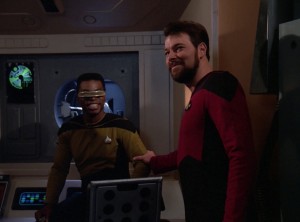I’m examining the impact Star Trek: The Next Generation had on my formation. The introduction to this series can be seen here.
With the Borg threat looming, Starfleet decides to test its tactical readiness with wargames. Picard and Riker are pitted against each other in simulated battle.
The overall theme of the episode is competition, and how various individuals approach it. Considering how much competitiveness was both valued and taken as a given in my family of origin (and in the larger culture), it was wonderfully refreshing to hear people talking about it, exploring it and observing how various personalities interact with it. I again got ideas from this episode about how the world worked around me that I wouldn’t find elsewhere for years.
Both Picard and Riker are initially uninterested in wargames, feeling that military strategizing is not a major purpose of Starfleet. That prioritizing of exploration and diplomacy over warfare or conquest was one of the main reasons I enjoyed this show more than the original. But, eventually both Picard and Riker get emotionally invested in the competition, in one form or another. Riker is especially in his element as his aggressive, competitive streak comes to the forefront. Picard’s primary emotional interaction in the competition seems to be pride in his first officer’s performance (again, he is highly motivated by nurturance and relationality). Worf is also initially uninterested, but for a different reason: because it’s simply a game. If there is nothing to lose, there’s nothing to gain, and he expects it to be a waste of time. Riker gets him interested by connecting his sense of honor to his performance in the game.

Dr. Pulaski manages to manipulate Data into competing with a skilled guest on board, and Data is shaken when he loses — to the point of relieving himself of duties. He believes that losing the game shows him as vulnerable, and shows his deductions as lacking, so he must be damaged somehow. Picard must explain to him that it’s possible to make no mistakes and still lose, and that making mistakes and being fallible doesn’t cancel out his duty to his colleagues. Data is also counseled that he can handle defeat in one of two ways: lose confidence in himself, or learn from his mistakes. This was another moment where Picard was effectively parenting me, offering things I needed to hear and didn’t from any any other source.
Pulaski at one point verbalizes some of the appeal of the urge to compete. She says humans have “an inborn craving to gauge [our] capabilities through conflict†and “humans sometimes find it helpful to have an outsider set the standard by which they’re judged.†While I’ve never had a strongly developed urge to compete, these articulations of competition helped me apply the idea to my own life, and find ways to enjoy competition — at the very least, with myself.
Leave a Reply